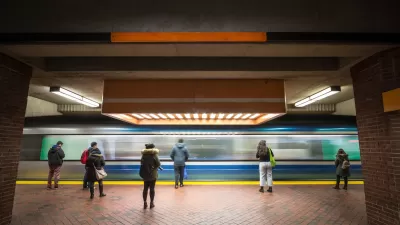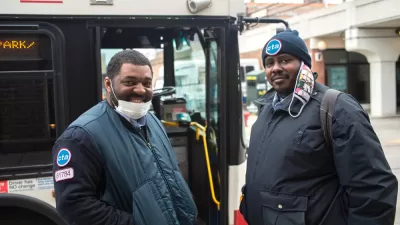Facing severe staffing shortages and high rates of burnout, transit agencies must improve their human resources departments and create healthier work environments to address current lapses in service.

A new report highlights major human resources shortcomings at transit agencies around the country that extend far beyond bus and train operator shortages to administrative and white-collar transit jobs, writes Kea Wilson in Streetsblog USA. “In a follow up to their much-discussed report on the national bus and train operator shortage, researchers at Transit Center dug into the structural factors behind the troubling ‘lack of people power’ happening at virtually every level of agency operations.”
Poor working conditions are driving many workers away, and almost half of workers are over the age of 55 and approaching retirement. “And even as agencies step up to help struggling riders with nowhere else to go and fix broken systems they didn't create, they're not always given extra resources to do it; they just stretch their budgets, and themselves, thinner and thinner,” Wilson adds.
Laurel Paget-Seekins, the primary author of the report, says this “cycle of exhaustion isn’t inevitable,” but that transit agencies must boost funding and resources for their HR departments and build a “strong foundation without which the sustainable transportation ecosystem can't possibly be expected to thrive, and without which many agencies are struggling to simply survive.”
FULL STORY: To Make Transit Work, We Need to Make Transit Agencies Better Workplaces

Planetizen Federal Action Tracker
A weekly monitor of how Trump’s orders and actions are impacting planners and planning in America.

Maui's Vacation Rental Debate Turns Ugly
Verbal attacks, misinformation campaigns and fistfights plague a high-stakes debate to convert thousands of vacation rentals into long-term housing.

San Francisco Suspends Traffic Calming Amidst Record Deaths
Citing “a challenging fiscal landscape,” the city will cease the program on the heels of 42 traffic deaths, including 24 pedestrians.

Amtrak Rolls Out New Orleans to Alabama “Mardi Gras” Train
The new service will operate morning and evening departures between Mobile and New Orleans.

The Subversive Car-Free Guide to Trump's Great American Road Trip
Car-free ways to access Chicagoland’s best tourist attractions.

San Antonio and Austin are Fusing Into one Massive Megaregion
The region spanning the two central Texas cities is growing fast, posing challenges for local infrastructure and water supplies.
Urban Design for Planners 1: Software Tools
This six-course series explores essential urban design concepts using open source software and equips planners with the tools they need to participate fully in the urban design process.
Planning for Universal Design
Learn the tools for implementing Universal Design in planning regulations.
Heyer Gruel & Associates PA
JM Goldson LLC
Custer County Colorado
City of Camden Redevelopment Agency
City of Astoria
Transportation Research & Education Center (TREC) at Portland State University
Jefferson Parish Government
Camden Redevelopment Agency
City of Claremont




























